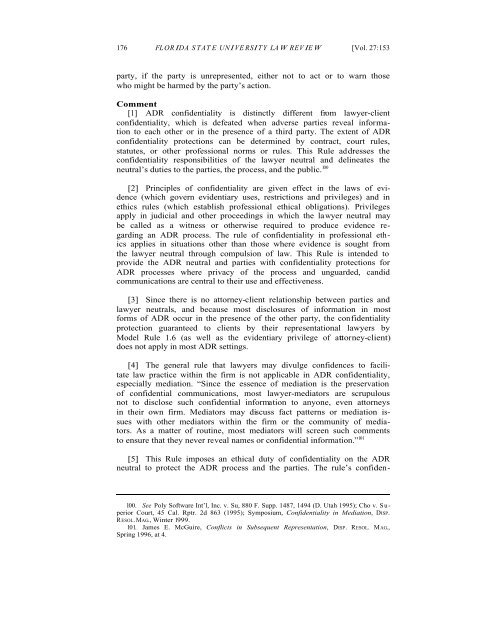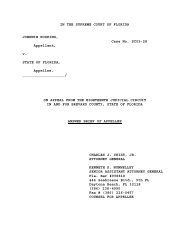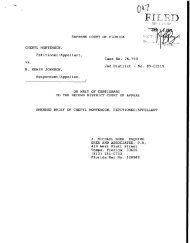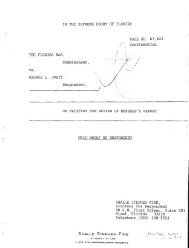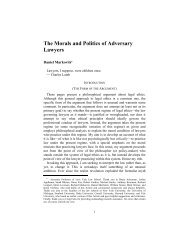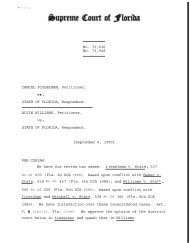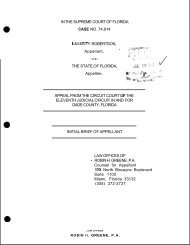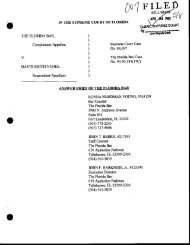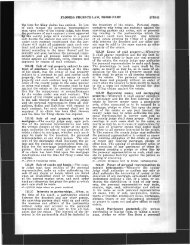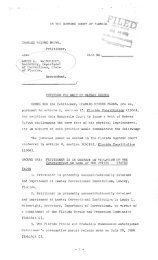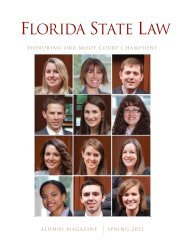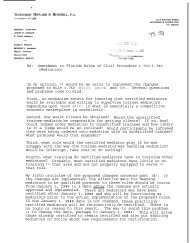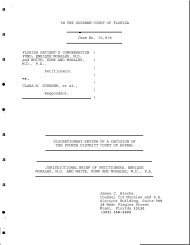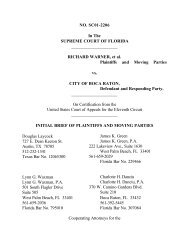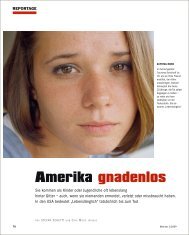ethics and professionalism in non- adversarial lawyering
ethics and professionalism in non- adversarial lawyering
ethics and professionalism in non- adversarial lawyering
Create successful ePaper yourself
Turn your PDF publications into a flip-book with our unique Google optimized e-Paper software.
176 FL O R I D A S T AT E U N I V E RSI T Y LA W RE V I E W [Vol. 27:153<br />
party, if the party is unrepresented, either not to act or to warn those<br />
who might be harmed by the party’s action.<br />
Comment<br />
[1] ADR confidentiality is dist<strong>in</strong>ctly different from lawyer-client<br />
confidentiality, which is defeated when adverse parties reveal <strong>in</strong>formation<br />
to each other or <strong>in</strong> the presence of a third party. The extent of ADR<br />
confidentiality protections can be determ<strong>in</strong>ed by contract, court rules,<br />
statutes, or other professional norms or rules. This Rule addresses the<br />
confidentiality responsibilities of the lawyer neutral <strong>and</strong> del<strong>in</strong>eates the<br />
neutral’s duties to the parties, the process, <strong>and</strong> the public. 100<br />
[2] Pr<strong>in</strong>ciples of confidentiality are given effect <strong>in</strong> the laws of evidence<br />
(which govern evidentiary uses, restrictions <strong>and</strong> privileges) <strong>and</strong> <strong>in</strong><br />
<strong>ethics</strong> rules (which establish professional ethical obligations). Privileges<br />
apply <strong>in</strong> judicial <strong>and</strong> other proceed<strong>in</strong>gs <strong>in</strong> which the lawyer neutral may<br />
be called as a witness or otherwise required to produce evidence regard<strong>in</strong>g<br />
an ADR process. The rule of confidentiality <strong>in</strong> professional <strong>ethics</strong><br />
applies <strong>in</strong> situations other than those where evidence is sought from<br />
the lawyer neutral through compulsion of law. This Rule is <strong>in</strong>tended to<br />
provide the ADR neutral <strong>and</strong> parties with confidentiality protections for<br />
ADR processes where privacy of the process <strong>and</strong> unguarded, c<strong>and</strong>id<br />
communications are central to their use <strong>and</strong> effectiveness.<br />
[3] S<strong>in</strong>ce there is no attorney-client relationship between parties <strong>and</strong><br />
lawyer neutrals, <strong>and</strong> because most disclosures of <strong>in</strong>formation <strong>in</strong> most<br />
forms of ADR occur <strong>in</strong> the presence of the other party, the confidentiality<br />
protection guaranteed to clients by their representational lawyers by<br />
Model Rule 1.6 (as well as the evidentiary privilege of attorney-client)<br />
does not apply <strong>in</strong> most ADR sett<strong>in</strong>gs.<br />
[4] The general rule that lawyers may divulge confidences to facilitate<br />
law practice with<strong>in</strong> the firm is not applicable <strong>in</strong> ADR confidentiality,<br />
especially mediation. “S<strong>in</strong>ce the essence of mediation is the preservation<br />
of confidential communications, most lawyer-mediators are scrupulous<br />
not to disclose such confidential <strong>in</strong>formation to anyone, even attorneys<br />
<strong>in</strong> their own firm. Mediators may discuss fact patterns or mediation issues<br />
with other mediators with<strong>in</strong> the firm or the community of mediators.<br />
As a matter of rout<strong>in</strong>e, most mediators will screen such comments<br />
to ensure that they never reveal names or confidential <strong>in</strong>formation.” 101<br />
[5] This Rule imposes an ethical duty of confidentiality on the ADR<br />
neutral to protect the ADR process <strong>and</strong> the parties. The rule’s confiden-<br />
100. See Poly Software Int’l, Inc. v. Su, 880 F. Supp. 1487, 1494 (D. Utah 1995); Cho v. S u-<br />
perior Court, 45 Cal. Rptr. 2d 863 (1995); Symposium, Confidentiality <strong>in</strong> Mediation, DISP.<br />
RESOL. MAG., W<strong>in</strong>ter 1999.<br />
101. James E. McGuire, Conflicts <strong>in</strong> Subsequent Representation, DISP. RESOL. MAG.,<br />
Spr<strong>in</strong>g 1996, at 4.


